Abstract
Passive transfer of monoclonal anti-progesterone antibodies shortly after mating blocks the onset of pregnancy in different species (mouse, rat, and ferret). Here we report that BALB/c mice can be actively immunized against progesterone, and hence against pregnancy, by means of rabbit anti-idiotypic antibodies specific for a mouse monoclonal anti-progesterone antibody, DB3. Some of the anti-idiotypic antibodies reacted with the steroid-combining site on the DB3 molecule. In response to repeated anti-idiotypic immunization, mice produced serum anti-progesterone antibodies (up to 100 micrograms/ml) that resembled DB3 in idiotypy, affinity, and specificity for progesterone and other steroid ligands. Thus an anti-idiotype can mimic the antigenicity of a steroid hormone with a high degree of accuracy. Compared with immunization with a progesterone-bovine serum albumin conjugate, the anti-progesterone response to anti-idiotype was considerably lower and clonally restricted. When mated after completion of the immunization course, the fertility rate of anti-idiotype-immunized mice was reduced to 30% from a control level of 91%. The anti-fertility effect was correlated with the circulating anti-progesterone concentration in individual animals and persisted for 4 or 5 estrous cycles. Active immunization with progesterone-bovine serum albumin was a highly effective means of rendering mice infertile; it reduced the fertility rate to zero over 16 or 17 estrous cycles. Our results suggest that anti-idiotypes may form the basis of contraceptive vaccines.
Full text
PDF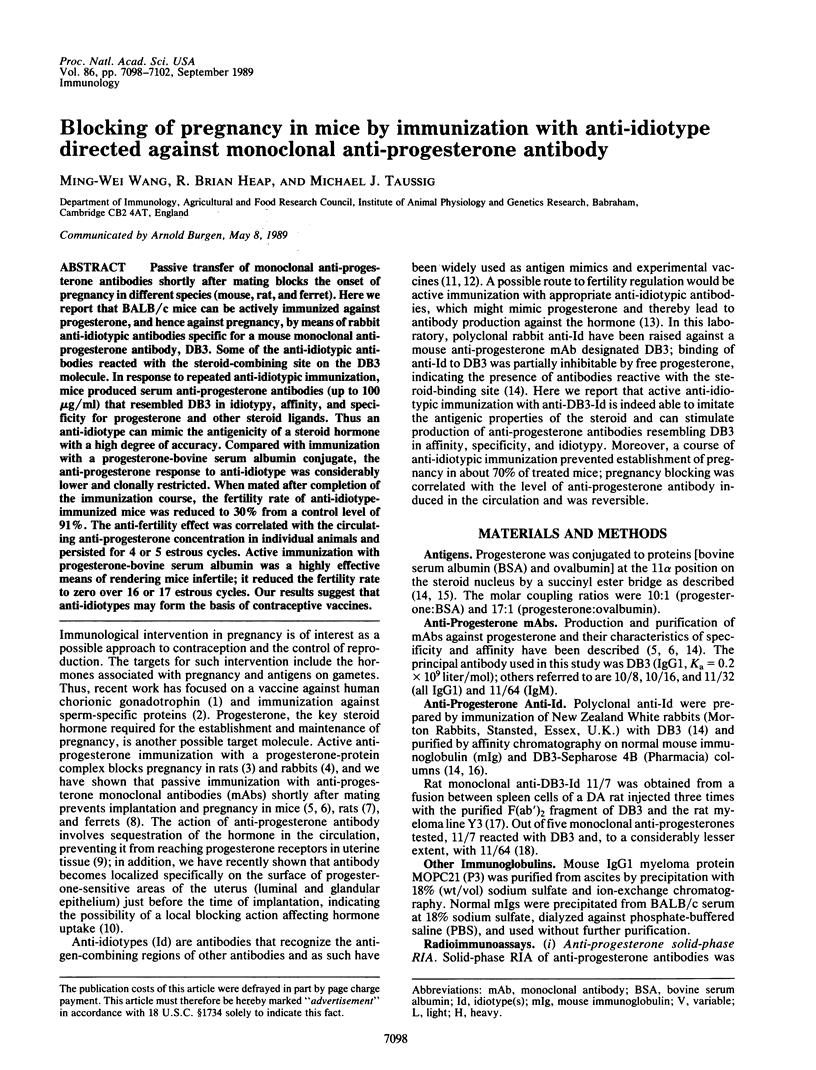
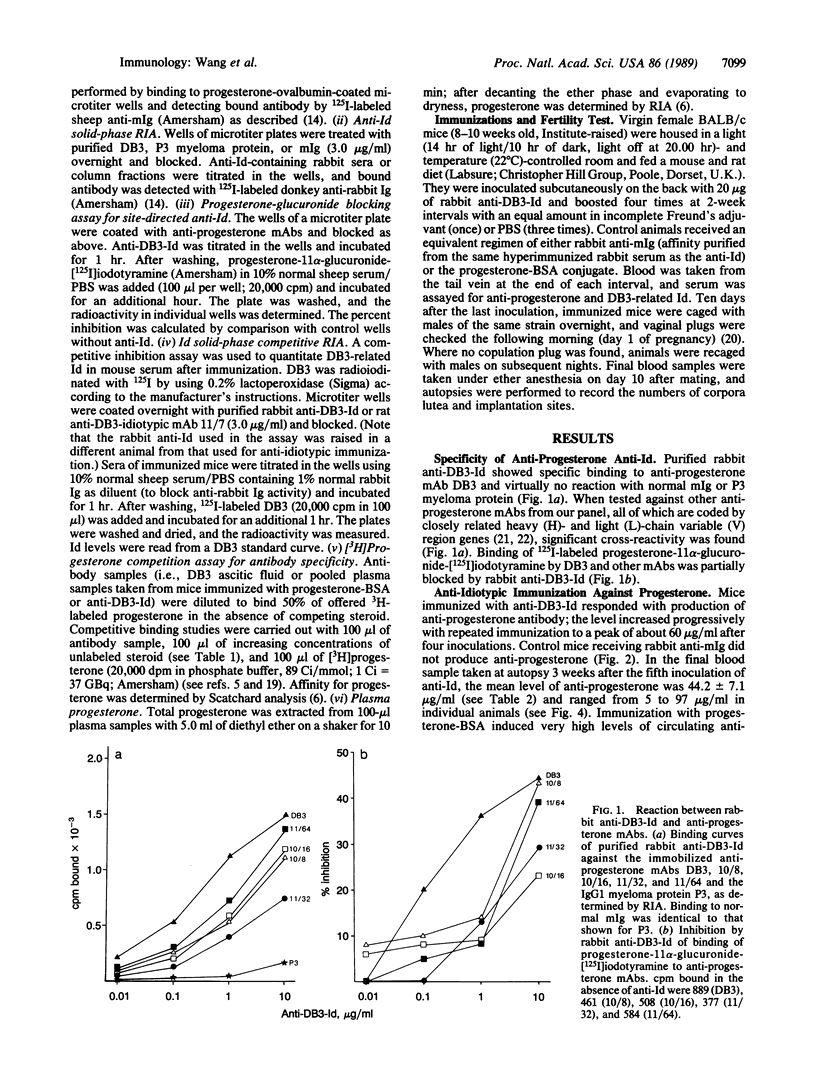
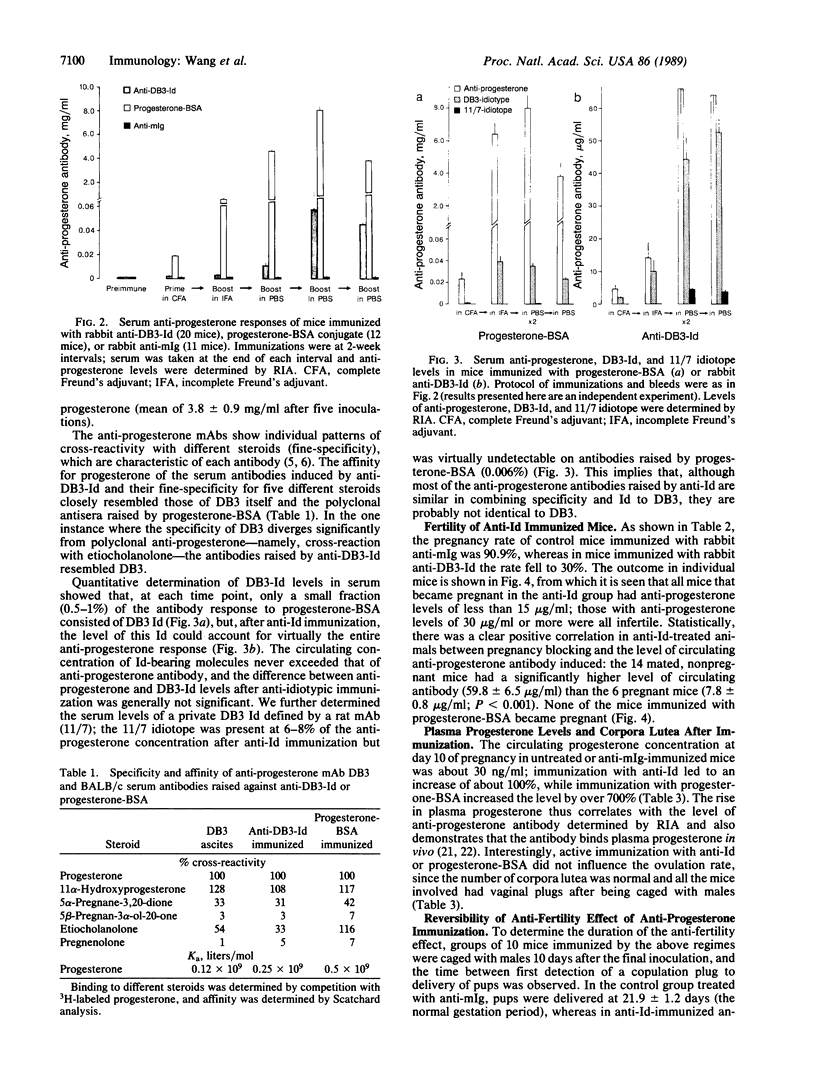
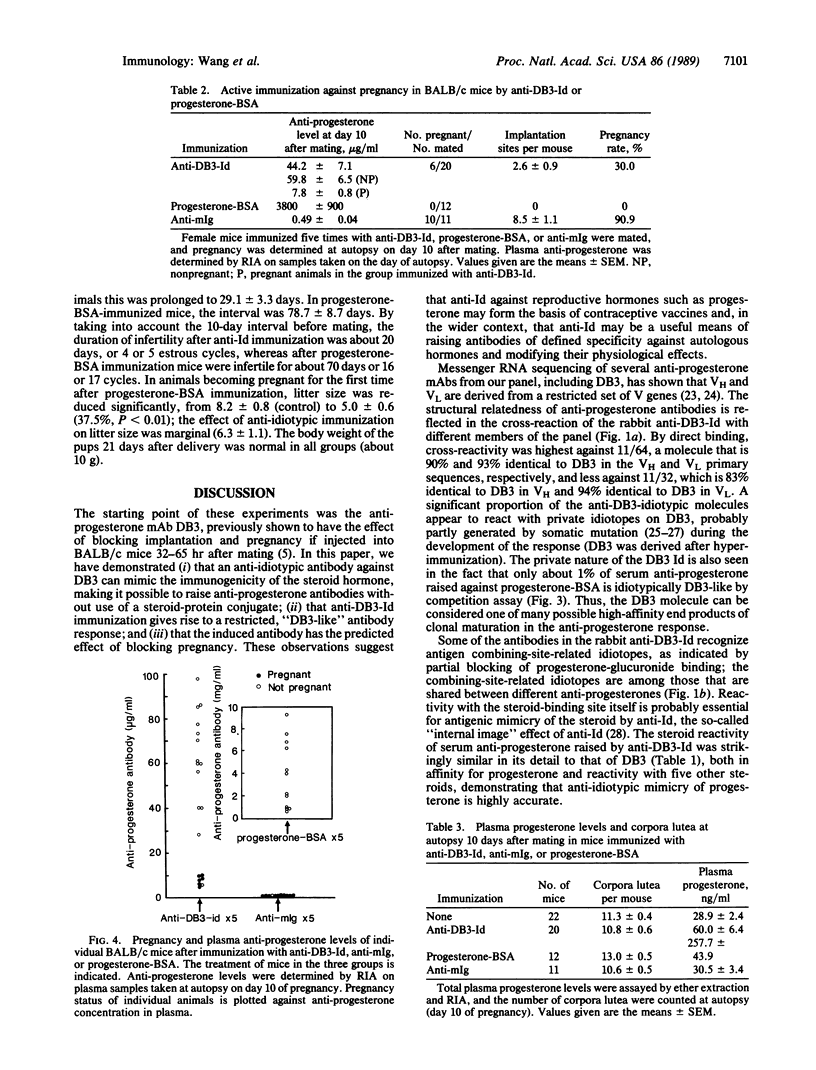
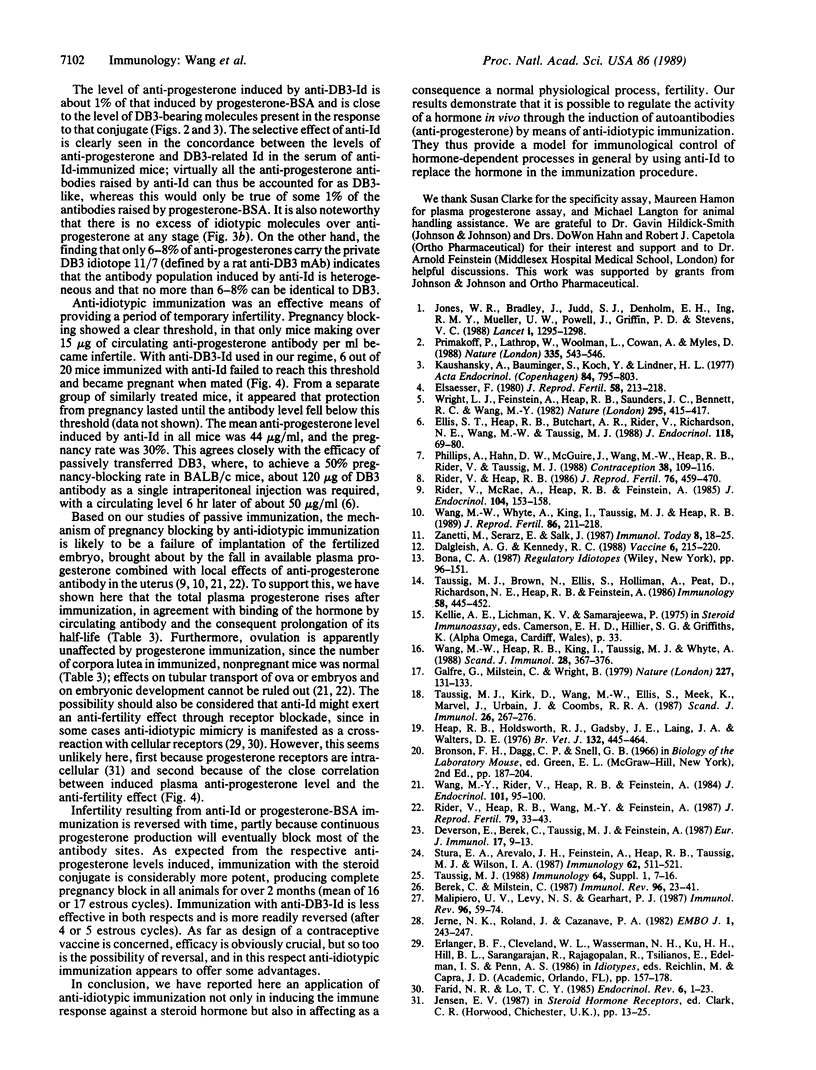
Images in this article
Selected References
These references are in PubMed. This may not be the complete list of references from this article.
- Berek C., Milstein C. Mutation drift and repertoire shift in the maturation of the immune response. Immunol Rev. 1987 Apr;96:23–41. doi: 10.1111/j.1600-065x.1987.tb00507.x. [DOI] [PubMed] [Google Scholar]
- Dalgleish A. G., Kennedy R. C. Anti-idiotypic antibodies as immunogens: idiotype-based vaccines. Vaccine. 1988 Jun;6(3):215–220. doi: 10.1016/0264-410x(88)90213-7. [DOI] [PubMed] [Google Scholar]
- Deverson E., Berek C., Taussig M., Feinstein A. Monoclonal BALB/c anti-progesterone antibodies use family IX variable region heavy chain genes. Eur J Immunol. 1987 Jan;17(1):9–13. doi: 10.1002/eji.1830170103. [DOI] [PubMed] [Google Scholar]
- Ellis S. T., Heap R. B., Butchart A. R., Rider V., Richardson N. E., Wang M. W., Taussig M. J. Efficacy and specificity of monoclonal antibodies to progesterone in preventing the establishment of pregnancy in the mouse. J Endocrinol. 1988 Jul;118(1):69–80. doi: 10.1677/joe.0.1180069. [DOI] [PubMed] [Google Scholar]
- Elsaesser F. Effects of active immunization against oestradiol-17 beta, testosterone or progesterone on receptivity in the female rabbit and evaluation of specificity. J Reprod Fertil. 1980 Jan;58(1):213–218. doi: 10.1530/jrf.0.0580213. [DOI] [PubMed] [Google Scholar]
- Farid N. R., Lo T. C. Antiidiotypic antibodies as probes for receptor structure and function. Endocr Rev. 1985 Winter;6(1):1–23. doi: 10.1210/edrv-6-1-1. [DOI] [PubMed] [Google Scholar]
- Galfrè G., Milstein C., Wright B. Rat x rat hybrid myelomas and a monoclonal anti-Fd portion of mouse IgG. Nature. 1979 Jan 11;277(5692):131–133. doi: 10.1038/277131a0. [DOI] [PubMed] [Google Scholar]
- Heap R. B., Holdsworth R. J., Gadsby J. E., Laing J. A., Walters D. E. Pregnancy diagnosis in the cow from milk progesterone concentration. Br Vet J. 1976 Sep-Oct;132(5):445–464. doi: 10.1016/s0007-1935(17)34582-7. [DOI] [PubMed] [Google Scholar]
- Jerne N. K., Roland J., Cazenave P. A. Recurrent idiotopes and internal images. EMBO J. 1982;1(2):243–247. doi: 10.1002/j.1460-2075.1982.tb01154.x. [DOI] [PMC free article] [PubMed] [Google Scholar]
- Jones W. R., Bradley J., Judd S. J., Denholm E. H., Ing R. M., Mueller U. W., Powell J., Griffin P. D., Stevens V. C. Phase I clinical trial of a World Health Organisation birth control vaccine. Lancet. 1988 Jun 11;1(8598):1295–1298. doi: 10.1016/s0140-6736(88)92117-4. [DOI] [PubMed] [Google Scholar]
- Kaushansky A., Bauminger S., Koch Y., Lindner H. R. Endocrine and reproductive repercussions of immunization against progesterone and oestradiol in female rats. Acta Endocrinol (Copenh) 1977 Apr;84(4):795–803. doi: 10.1530/acta.0.0840795. [DOI] [PubMed] [Google Scholar]
- Malipiero U. V., Levy N. S., Gearhart P. J. Somatic mutation in anti-phosphorylcholine antibodies. Immunol Rev. 1987 Apr;96:59–74. doi: 10.1111/j.1600-065x.1987.tb00509.x. [DOI] [PubMed] [Google Scholar]
- Phillips A., Hahn D. W., McGuire J., Wang M. W., Heap R. B., Rider V., Taussig M. J. Inhibition of pregnancy before and after implantation in rats with monoclonal antibody against progesterone. Contraception. 1988 Jul;38(1):109–116. doi: 10.1016/0010-7824(88)90100-x. [DOI] [PubMed] [Google Scholar]
- Primakoff P., Lathrop W., Woolman L., Cowan A., Myles D. Fully effective contraception in male and female guinea pigs immunized with the sperm protein PH-20. Nature. 1988 Oct 6;335(6190):543–546. doi: 10.1038/335543a0. [DOI] [PubMed] [Google Scholar]
- Rider V., Heap R. B. Heterologous anti-progesterone monoclonal antibody arrests early embryonic development and implantation in the ferret (Mustela putorius). J Reprod Fertil. 1986 Jan;76(1):459–470. doi: 10.1530/jrf.0.0760459. [DOI] [PubMed] [Google Scholar]
- Rider V., Heap R. B., Wang M. Y., Feinstein A. Anti-progesterone monoclonal antibody affects early cleavage and implantation in the mouse by mechanisms that are influenced by genotype. J Reprod Fertil. 1987 Jan;79(1):33–43. doi: 10.1530/jrf.0.0790033. [DOI] [PubMed] [Google Scholar]
- Rider V., McRae A., Heap R. B., Feinstein A. Passive immunization against progesterone inhibits endometrial sensitization in pseudopregnant mice and has antifertility effects in pregnant mice which are reversible by steroid treatment. J Endocrinol. 1985 Jan;104(1):153–158. doi: 10.1677/joe.0.1040153. [DOI] [PubMed] [Google Scholar]
- Stura E. A., Arevalo J. H., Feinstein A., Heap R. B., Taussig M. J., Wilson I. A. Analysis of an anti-progesterone antibody: variable crystal morphology of the Fab' and steroid-Fab' complexes. Immunology. 1987 Dec;62(4):511–521. [PMC free article] [PubMed] [Google Scholar]
- Taussig M. J., Brown N., Ellis S., Holliman A., Peat D., Richardson N., Heap R. B., Feinstein A. Anti-idiotypic sera against monoclonal anti-progesterone antibodies: production in rabbits and rats and characterization of specificity. Immunology. 1986 Jul;58(3):445–452. [PMC free article] [PubMed] [Google Scholar]
- Taussig M. J., Kirk D., Wang M. W., Ellis S., Meek K., Marvel J., Urbain J., Coombs R. R. Idiotype-anti-idiotype interactions of VHIX-coded anti-progesterone and anti-arsonate antibodies. Comparison of passive haemagglutination and radioimmunoassays. Scand J Immunol. 1987 Sep;26(3):267–276. doi: 10.1111/j.1365-3083.1987.tb02260.x. [DOI] [PubMed] [Google Scholar]
- Wang M. W., Heap R. B., King I., Taussig M. J., Whyte A. Anti-idiotypic antibody used for the localization of parenterally administered monoclonal anti-progesterone antibody in mice. Scand J Immunol. 1988 Sep;28(3):367–376. doi: 10.1111/j.1365-3083.1988.tb01462.x. [DOI] [PubMed] [Google Scholar]
- Wang M. W., Whyte A., King I., Taussig M. J., Heap R. B. Immunofluorescent localization, by use of anti-idiotypic antibody, of monoclonal anti-progesterone antibody in the mouse uterus before implantation. J Reprod Fertil. 1989 May;86(1):211–218. doi: 10.1530/jrf.0.0860211. [DOI] [PubMed] [Google Scholar]
- Wang M. Y., Rider V., Heap R. B., Feinstein A. Action of anti-progesterone monoclonal antibody in blocking pregnancy after postcoital administration in mice. J Endocrinol. 1984 Apr;101(1):95–100. doi: 10.1677/joe.0.1010095. [DOI] [PubMed] [Google Scholar]
- Wright L. J., Feinstein A., Heap R. B., Saunders J. C., Bennett R. C., Wang M. Y. Progesterone monoclonal antibody blocks pregnancy in mice. Nature. 1982 Feb 4;295(5848):415–417. doi: 10.1038/295415a0. [DOI] [PubMed] [Google Scholar]




